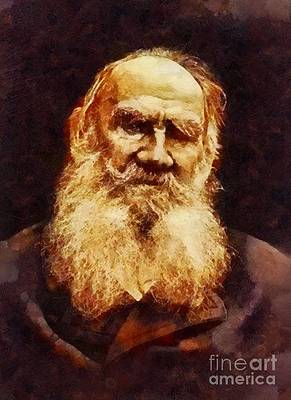Leo Tolstoy Archive
Written: 1887
Source: Original Text from Gutenberg.org
Transcription/Markup: Andy Carloff
Online Source: RevoltLib.com; 2021

At ten o'clock in the evening the troops were ordered to march. At half-past nine I mounted my horse, and started off to find the general; but on reflecting that he and his adjutant must be busy, I remained in the street, and, tying my horse to a fence, sat down on the terrace to wait until the general should come.
The heat and glare of the day had already vanished in the fresh night air; and the obscure light of the young moon, which, infolding around itself a pale gleaming halo against the dark blue of the starry sky, was beginning to decline. Lights shone in the windows of the houses and in the chinks of the earth huts. The gracefully proportioned poplars in the gardens, standing out against the horizon from behind the earth huts, whose reed-thatched roofs gleamed pale in the moonlight, seemed still taller and blacker.
The long shadows of the houses, of the trees, of the fences, lay beautifully across the white dusty road. In the river rang incessantly the voice of the frogs;[17] in the streets were heard hurrying steps, and sounds of voices, and the galloping of horses. From the suburb came floating, now and again, the strains of the hand-organ; now the popular Russian air, "The winds are blowing," now one of the Aurora waltzes.
I will not tell what my thoughts were: in the first* place, because I should be ashamed to confess to the melancholy ideas which without cessation arose in my mind, while all around me I perceived only gaiety and mirth; and, in the second place, because they have nothing to do with my story.
I was so deeply engrossed in thought, that I did not notice that the bell was ringing for eleven o'clock, and the general was riding past me with his suite.
The rearguard was just at the fortress gate. I galloped at full speed across the bridge, amid a crush of cannon, caissons, military wagons, and commanding officers shouting at the top of their voices. After reaching the gate, I rode at a brisk trot for almost a verst, past the army stretched out and silently moving through the darkness, and overtook the general. As I made my way past the mounted artillery dragging their ordnance, amid the cannon and officers, a German voice, like a disagreeable dissonance interrupting soft and majestic harmony, struck my ear. It screamed, "Agkhtingkhist,[18] bring a linstock."
And a soldier's voice replied, quick as a flash, "Chevchenko! the lieutenant asks for a light!"
The greater part of the sky had become enveloped in long steel-gray clouds: here and there gleamed from between them the lusterless stars. The moon was now sinking behind the near horizon of dark mountains which were on the right; and it shed on their summits a feeble, waning, half light, which contrasted sharply with the impenetrable darkness that marked their bases.
The air was mild, and so still, that not a single grass-blade, not a single mist-wreath, moved. It became so dark, that it was impossible to distinguish* objects, even though very near at hand. On the side of the road, there seemed to me sometimes to be rocks, sometimes animals, sometimes strange men; and I knew that they were bushes only when I heard them rustle, and felt the coolness of the dew with which they were covered. In front of me I saw a dense, waving black shadow, behind which followed a few moving spots; this was the van-guard of cavalry, and the general with his suite. Between us moved another similar black mass, but this was not as high as the first; this was the infantry.
Such silence reigned in the whole detachment, that there could be plainly distinguished all the harmonious voices of the night, full of mysterious charm. The distant melancholy howls of jackals, sometimes like the wails of despair, sometimes like laughter; the monotonous ringing song of the cricket, the frog, the quail; a gradually approaching murmur, the cause of which I could not make clear to my own mind; and all those nocturnal, almost audible motions of nature, which it is so impossible either to comprehend or define,—unite into one complete, beautiful harmony which we call silent night.
This silence was broken, or rather was unified, by the dull thud of the hoofs, and the rustling of the tall grass through which the division was slowly moving.
Occasionally, however, was heard in the ranks the ring of a heavy cannon, the sound of clashing bayonets, stifled conversation, and the snorting of a horse.
Nature breathed peacefully in beauty and power.
Is it possible that people find no room to live together in this beautiful world, under this boundless starry heaven? Is it possible that amid this bewitching nature, the soul of man can harbor the sentiments* of hatred and revenge, or the passion for inflicting destruction upon his kind? All ugly feelings in the heart of man ought, it would seem, to vanish away in this intercourse with nature,—with this immediate expression of beauty and goodness!